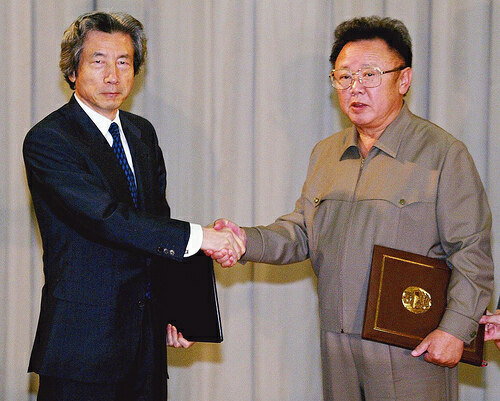North Korea admitted to the Cold War abductions of Japanese citizens during former Prime Minister Junichiro Koizumi’s landmark visit to Pyongyang in 2002. The revelation stalled further progress in normalising diplomatic relations between Japan and North Korea and triggered an avalanche of public criticism in Japan. Abe is a key advocate for the resolution of the issue, and it seems that his rapid political rise since the early 2000s is closely connected to his hard-line policy approach toward North Korea.
After returning to office in December 2012 Abe invested heavily in resolving the abduction issue and unilaterally exerted diplomatic pressure on North Korea. Tokyo supported UNSC Resolution 2094 following Pyongyang’s long-range missile launch in December 2012 and its nuclear test in February 2013, which sought to further restrict travel of North Korean diplomats, cash transfers and the import of luxury goods into North Korea. Abe prohibited senior Chongryun officials from re-entering Japan after visiting North Korea, and in March Chongryun’s headquarters in Tokyo, functioning as North Korea’s ‘quasi embassy’ in Japan, was repossessed in an attempt by Japanese authorities to recover Chongryun’s debt to the Japanese government. In another attempt to pursue Abe’s hard-line policy toward North Korea, education minister Hakubun Shimomura instructed his ministry to exclude North Korean high schools in Japan from its program to waive tuition fees. Japan also announced in March it would follow the US and blacklist North Korea’s Foreign Trade Bank, which is believed to play a vital role in financing the North’s nuclear program.
Emphasising his willingness to renew the abduction issue and to make it a national priority, Abe launched the Bipartisan Council on the Abduction Issue on 29 January 2013. On the Council are some of the most renowned Japanese advocates for stricter sanctions on North Korea, including Kyoko Nakayama and Takeo Hiranuma from the Japan Restoration Party. Abe also appointed Keiji Furuya — former Secretary-General of the Parliamentarian League for Early Repatriation of Japanese Citizens Kidnapped by North Korea — as the minister in charge of the abduction issue, and thereby in charge of the Council. The Abe government has also allocated ¥1.2 billion (US$10 million) to the abduction issue in the 2013 budget — much more than the DPJ government had provided.
While Japan’s politics of pressure since 2002 have caused the current diplomatic impasse, the Abe government has relaxed its hawkish stance on North Korea, embarking on a course of dialogue to resolve the abduction issue. Iijima’s visit to Pyongyang in May was well timed, occurring precisely after North Korea moved away from its threats of launching further missiles. Iijima is no stranger to Japan’s diplomatic relations with North Korea — he was instrumental in facilitating Koizumi’s first visit to Pyongyang in 2002 and thus the return of the Japanese abductees. Iijima met with Kim Yong-nam, President of North Korea’s Presidium of the Supreme People’s Assembly, to discuss Abe’s call for an immediate return of all remaining Japanese abductees, an investigation into the kidnappings, and the handing over of those responsible for criminal punishment in Japan.
While Iijima’s trip to Pyongyang was supposed to remain a secret, North Korea leaked the visit to international media and used it to challenge its international isolation. Abe’s unilateral strategy was branded as ‘rogue diplomacy’ and criticised in Seoul as ‘unhelpful’, undermining trilateral efforts to bring North Korea back to the negotiating table. Washington also indicated it was unaware of such a visit being planned.
Despite the criticism, Abe has emphasised his willingness to push ahead with Japan’s own approach to handling North Korea. Abe pledged to solve the abduction issue during his ‘Japan is Back’ speech in Washington early this year. Abe has also indicated the possibility of a summit meeting between him and Kim Jong-un, and Japanese government sources have hinted at the possibility of further bilateral talks between the two countries.
As China has increased pressure on North Korea and tensions on the Korean Peninsula remain high, Pyongyang may consider embarking on renewed bilateral talks with Japan, which may offer Tokyo an opportunity to set its own priorities and push its own agenda. With Japan’s Upper House elections just around the corner, Abe will invest in delivering on his pledge. Abe has made it clear that resolving this issue is a priority, and that Japan has its own agenda independent of Washington and Seoul when it comes to North Korea. In this vein, Japan’s unilateral approach may uproot trilateral policy coordination with the US and South Korea.
However, while Japan, South Korea and the US broadly share the same security interests vis-à-vis North Korea, it does not prevent Tokyo from crafting its own diplomatic roadmap. Abe’s initiative to break the inertia in Japan–North Korea relations could also have the potential to generate positive spill-overs, such as in crafting solutions to North Korea’s nuclear and missile weapons programs.
Sebastian Maslow is Assistant Professor at the Centre for East Asian Studies, Heidelberg University and a doctoral candidate at the Graduate School of Law, Tohoku University.

